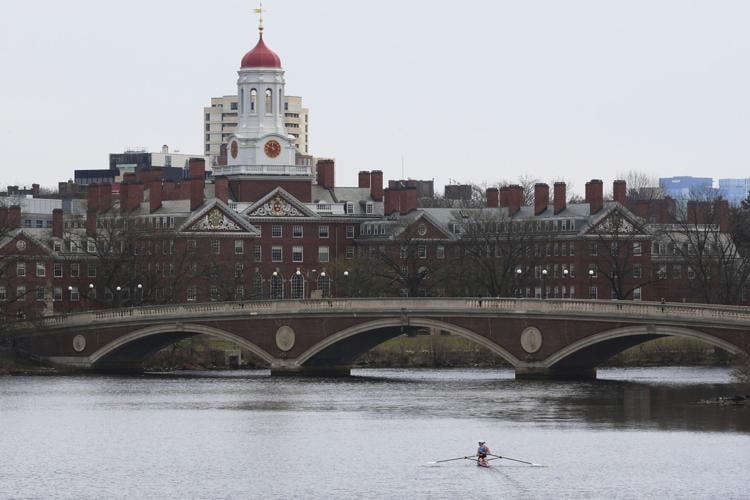WASHINGTON — A federal judge blocked the Trump administration Friday from cutting off Harvard's enrollment of foreign students, an action the Ivy League school described as unconstitutional retaliation for defying the White House's political demands.
In its lawsuit filed earlier in the day in federal court in Boston, Harvard said the government's action violates the First Amendment and will have an "immediate and devastating effect for Harvard and more than 7,000 visa holders."
"With the stroke of a pen, the government has sought to erase a quarter of Harvard's student body, international students who contribute significantly to the University and its mission," Harvard said in its suit. "Without its international students, Harvard is not Harvard."
The ruling from U.S. District Judge Allison Burroughs puts the sanction against Harvard on hold, pending the lawsuit.
People are also reading…

A sculler rows down the Charles River near Harvard University on April 15 in Cambridge, Mass.
The Trump administration move threw the campus into disarray days before graduation, Harvard said in the suit. International students who run labs, teach courses, assist professors and participate in Harvard sports are left deciding whether to transfer or risk losing legal status to stay in the country, according to the filing.
The impact is heaviest at graduate schools such as the Harvard Kennedy School, where almost half the student body comes from abroad, and Harvard Business School, which is about one-third international.
Harvard said it immediately puts the school at a disadvantage as it competes for the world's top students. Even if it regains the ability to host students, "future applicants may shy away from applying out of fear of further reprisals from the government," the suit said.
If the government's action stands, Harvard said, the university would be unable to offer admission to new international students for at least the next two academic years. Schools that have that certification withdrawn by the federal government are ineligible to reapply until one year afterward, Harvard said.
Harvard enrolls almost 6,800 foreign students from more than 100 countries at its campus in Cambridge, Massachusetts.
The Department of Homeland Security announced the action Thursday, accusing Harvard of creating an unsafe campus environment by allowing "anti-American, pro-terrorist agitators" to assault Jewish students on campus.

Homeland Security Secretary Kristi Noem salutes Wednesday as she arrives at the commencement for the United States Coast Guard Academy in New London, Conn.
It also accused Harvard of coordinating with the Chinese Communist Party, claiming the school hosted and trained members of a Chinese paramilitary group as recently as last year.
Harvard President Alan Garber said earlier this month the university made changes to its governance over the past year and a half, including a broad strategy to combat antisemitism. He said Harvard would not budge on its "its core, legally-protected principles" over fears of retaliation.
Harvard says it will respond at a later time to allegations first raised by House Republicans about coordination with the Chinese Communist Party.
The threat to Harvard's international enrollment stems from an April 16 request from Homeland Security Secretary Kristi Noem, who demanded Harvard provide information about foreign students that might implicate them in violence or protests that could lead to their deportation.
Harvard says it provided "thousands of data points" in response to Noem's April 16 demand. Her letter Thursday said Harvard failed to satisfy her request, but the school said she failed to provide further explanation.
"It makes generalized statements about campus environment and 'anti-Americanism,' again without articulating any rational link between those statements and the decision to retaliate against international students," the suit said.

The Harvard University logo is displayed April 15 on a building at the school in Cambridge, Mass.
Harvard's lawsuit said the administration violated the government's own regulations for withdrawing a school's certification.
The government can and does remove colleges from the Student Exchange and Visitor Program, making them ineligible to host foreign students on their campus. However, it's usually for administrative reasons outlined in law, such as failing to maintain accreditation, lacking proper facilities for classes, or failing to employ qualified professional personnel.
Noem said Harvard can regain its ability to host foreign students if it produces a trove of records on foreign students within 72 hours. Her updated request demands all records, including audio or video footage, of foreign students participating in protests or dangerous activity on campus.
The lawsuit is separate from the university's earlier one challenging more than $2 billion in federal cuts imposed by the Republican administration.
















